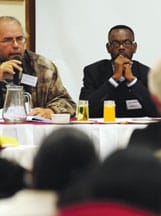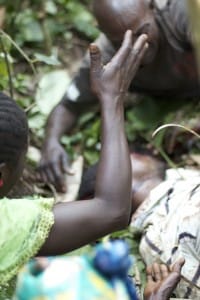by Ann Garrison
French translation by Marceline Nduwamungu follows
KPFA Weekend News broadcast Jan. 4, 2014
Competition for Congolese resources can’t be stopped, but the massacre of Congolese people can and must, says Dr. Jean Didier Losango.
Transcript
KPFA Evening News Anchor: The people of the Democratic Republic of the Congo, or DRC, have suffered violent conflict ever since the Rwandan conflict of the 1990s spilled across the Rwandan Congolese border in 1994. The First Congo War began in 1996, the second in 1998. The second war drew in all nine countries bordering the DRC, left millions dead, displaced millions more, and ignited conflicts that continue in the country’s mineral rich east, despite the peace treaty signed in 2003.

Now the DRC fears another regional war waged within its borders, possibly drawing in Rwanda, Uganda, South Africa, Burundi and Tanzania and powerful interests from outside the African continent. KPFA’s Ann Garrison spoke to scholar and mining researcher Dr. Jean Didier Losango about what can be done to stop the escalation of Congo’s human catastrophe.
KPFA: Congolese mining researcher Dr. Jean Didier Losango said that the conflict in eastern DR Congo is commonly described as ethnic, but it’s really a conflict over Congo’s vast resources, most of all its mineral resources. Most Congolese are indigenous agricultural peoples, who keep dying in wars for their enormous mineral wealth without any benefit to themselves and without even understanding the role these minerals play in modern manufacture. He agrees, he said, with what Congolese scholars and activists Maurice Carney and Dr. Yaa Lengi said in Friends of the Congo’s film, “Crisis in the Congo,” that first the killing has to stop.
Maurice Carney: You do not have to slaughter millions of people to get access to the cobalt for your color television, or access to the cobalt for your aerospace industry, or access to the copper for your automobile industry.
Dr. Yaa Lengi: All right, you’re dealing with the economy. You want the coltan. Man, Congolese people don’t eat coltan. Congolese people can’t eat gold. Talk to the Congolese people, who’re going to let you get the resources. But for God’s sake, stop killing the people! Stop letting Rwanda, Uganda and Joseph Kabila kill with impunity.
Talk to the Congolese people, who’re going to let you get the resources. But for God’s sake, stop killing the people! Stop letting Rwanda, Uganda and Joseph Kabila kill with impunity.
KPFA: Dr. Losango said that it’s time for the international community to acknowledge that millions of Congolese people have been killed, displaced, raped and/or dismembered in wars for minerals in the country’s East with no benefit to themselves.
First of all he said, again, the killing has to stop, and since the international competition for the resources of the eastern DRC cannot be stopped, people of mineral rich eastern Congo should be moved to other parts of the country, where they can re-establish their indigenous agricultural practices. As long as the people are in the way of the world’s most powerful nations and corporations’ resource interests, he said, the massacres, atrocities and displacement will continue.
Competition for Congolese resources can’t be stopped, but the massacre of Congolese people can and must, says Dr. Jean Didier Losango.
Then, he said, the people need roads to get their agricultural products to market and foreign investors who are willing to buy local products, train and employ local people, and build the infrastructure the country needs. Only China, he said, builds essential infrastructure in exchange for mining leases, and only China buys local products, training and employing local people. South Africa, he said, imports all the employees, building materials and even agriculture produce that it needs to operate in DRC from South Africa, leaving nothing for the Congolese people.

China and the U.S. are the two most powerful nations with the greatest hunger for Congo’s resources. Russ Feingold, U.S. envoy to the Great Lakes Region and the DRC, recently traveled to China to discuss their mutual resource interests in the DRC but reported only that the talks were cordial and productive.
I asked Dr. Losango how the Congolese people might claim some of the vast wealth extracted within their borders if, first, as he said, the killing can be stopped. He said that the Congolese people need the educational infrastructure to understand how essential their mineral wealth is to the manufacture of modern life. Colonial powers, he said, have made every effort to keep his people from understanding this.
Once Congolese people understand how their wealth is used around the world, their challenges will be building infrastructure and establishing governance in the interest of all Congolese people.
For Pacifica, KPFA and AfrobeatRadio, I’m Ann Garrison.
David Landau: And our reporter Ann Garrison was actually speaking Dr. Losango’s words because his French accent is a little bit thick.
Note: Thanks to Dr. Losango for learning the English language to speak to the English speaking world about this. French is the European language most used in DR Congo, which was the personal property of King Leopold of Belgium from 1885 to 1902, when it became a Belgian colony, until 1960. – AG
Oakland writer Ann Garrison writes for the San Francisco Bay View, Black Agenda Report, Black Star News, Counterpunch, Colored Opinions and her own website, Ann Garrison, and produces for AfrobeatRadio on WBAI-NYC, KPFA Evening News, KPFA Flashpoints and for her own YouTube Channel, AnnieGetYourGang. She can be reached at ann@afrobeatradio.com. In March 2014 she was awarded the Victoire Ingabire Umuhoza Democracy and Peace Prize for promoting peace in the Great Lakes Region of Africa through her reporting.
Arrêtez de tuer le peuple congolais
Proposé par Ann Garrison
Le journal du week-end de KPFA, 4 janvier 2015
La compétition pour les ressources congolaises ne peut pas être arrêtée mais le massacre du peuple congolais peut et doit prendre fin. C’est ce que dit Dr. Jean Didier Losango.
Résumé
Le présentateur du journal du week-end de KPFA : le peuple de la République démocratique du Congo ou RDC, ont subi de violentes atrocités depuis que le conflit rwandais des années 1990 a traversé la frontière rwando-congolaise en 1994. La première guerre congolaise a commencé en 1996 et la deuxième en 1998. La deuxième guerre a impliqué neuf pays, tous voisins de la RDC, elle a laissé derrière elle des millions de morts, elle a laissé des millions de déplacés et a déclenché les conflits qui se poursuivent dans la partie est du pays, riche en minerais, malgré le traité de paix signé en 2003. Maintenant, la RDC craint une autre guerre régionale le long de ses frontières, impliquant probablement le Rwanda, l’Uganda, la République Sud-africaine, le Burundi et la Tanzanie et d’autres grands pays en dehors de l’Afrique. Ann Garrison s’est entretenue avec le spécialiste et chercheur dans le domaine minier, Dr Jean Didier Losango, sur ce qui peut être mis en œuvre afin de mettre fin à l’escalade de la catastrophe humaine congolaise.
KPFA: L’ingénieur minier congolais Dr Jean Didier Losango a dit que le conflit à l’est du Congo est souvent décrit comme ethnique mais en réalité, c’est un conflit en rapport avec ses immenses ressources naturelles, essentiellement minières. La majorité du peuple congolais sont de simples agriculteurs indigènes qui continuent à mourir des guerres de pillage de leurs ressources minières dont ils ne profitent pas, sans même comprendre le rôle de ces minerais dans l’industrie moderne. Il est d’accord, dit-il, sur ce que les académiciens et activistes congolais Maurice Carney et Dr Yaa Lengi ont dit dans le film des Amis du Congo, Crisis in the Congo, que les massacres doivent d’abord cesser.
Maurice Carney : Il n’y a pas besoin de massacrer des millions de gens pour avoir accès au cobalt pour les télévisions en couleur ou l’industrie aérospatiale et l’accès au cuivre pour l’industrie automobile.
Dr Yaa Lengi : ok, vous vous occupez de l’économie. Vous voulez le coltan. Gaillard, le peuple congolais ne mange pas le coltan. Le peuple congolais ne mange pas e l’or. Allez parler au peuple congolais qui vous laissera prendre les ressources, mais pour l’amour du Ciel, arrêtez de tuer les gens. Arrêtez de permettre au Rwanda, l’Uganda et Joseph Kabila de tuer impunément.
KPFA : Dr Losango a dit qu’il est temps pour la communauté internationale de reconnaître que des millions de congolais ont été tués, déplacés, violés et/ou démembrés dans des guerres pour les ressources minières de l’est du pays sans qu’ils puissent profiter des revenus de ces mines.
Il a redit que les massacres doivent s’arrêter, et que dès lors que la compétition internationale pour les ressources minières de l’est du Congo ne peut pas être arrêtée, les habitants de cette région devraient être relocalisés dans d’autres parties du pays, où ils peuvent continuer à pratiquer l’agriculture paisiblement. Aussi longtemps que les habitants seront sur la route des plus grands pays de ce monde et des intérêts des multinationales, a-t-il dit, les massacres, les atrocités et les déplacements de populations continueront.
Puis, il a dit, les populations auront besoin de routes pour écouler leurs produits sur les marchés et des investisseurs étrangers prêts à acheter les produits locaux, à former et à embaucher la main-d’œuvre locale, et à construire les infrastructures dont le pays a besoin. Seule la Chine, a-t-il dit, construit les infrastructures nécessaires en échange des concessions minières et seuls les chinois achètent les produits locaux, forment et emploient la main-d’œuvre locale. L’Afrique du Sud, a-t-il dit, arrive avec tous les employés, les matériaux de construction et même des produits vivriers dont ils ont besoin pour fonctionner en RDC, ne laissant rien au peuple congolais.
La Chine et les Etats-Unis sont les deux grandes puissances en proie aux ressources congolaises. Russ Feingold, l’envoyé spécial dans la Région des Grands Lacs et en RDC, a récemment voyagé en Chine pour parler des intérêts mutuels de leurs pays en RDC mais il a juste communiqué que leurs discussions étaient cordiales et productives.
J’ai demandé au Dr Losango comment le peuple congolais pourrait profiter des richesses extraites de leur sol si, avant tout, les massacres doivent s’arrêter. Il a dit que le peuple congolais a besoin d’être formé afin de comprendre l’importance de leur richesse minérale dans l’industrie moderne. Le pouvoir colonial, a-t-il dit, a tout fait pour garder le peuple ignorant de tout cela.
Une fois que le peuple congolais aura compris l’utilité de ses richesses dans le monde, ses soucis seront de construire les infrastructures et la mise en place d’une gouvernance qui défend les intérêts des tous les congolais.
Pour Pacifica, KPFA et AfrobeatRadio, vous étiez avec Ann Garrison.
David Landau: Notre reporter Ann Garrison a repris les mots du Dr Losango dont l’accent français est fort prononcé.
NB : Merci à Dr Losango d’avoir appris l’anglais pour pouvoir parler au monde anglophone de ce qui se passe en RDC. Le français est une langue européenne, très usitée en RDC, qui fut la propriété personnelle du Roi Léopold de Belgique de 1885 à 1902, quand elle est devenue une colonie belge jusqu’en 1960. AG





